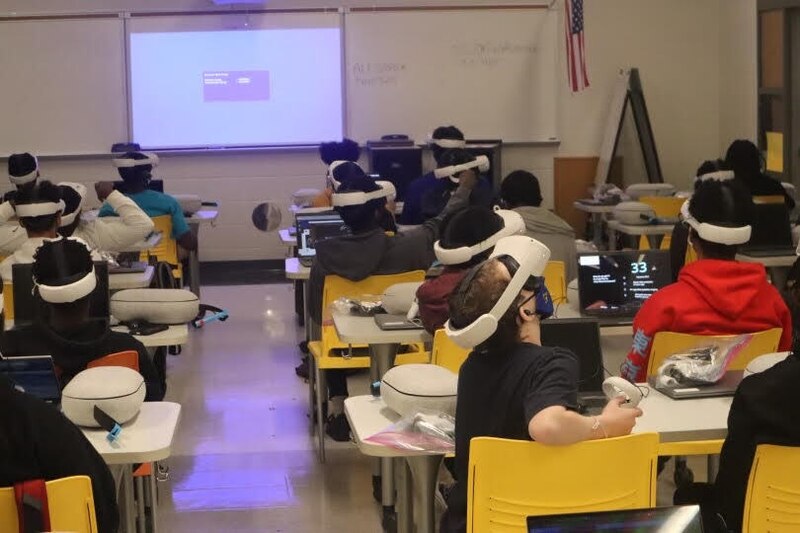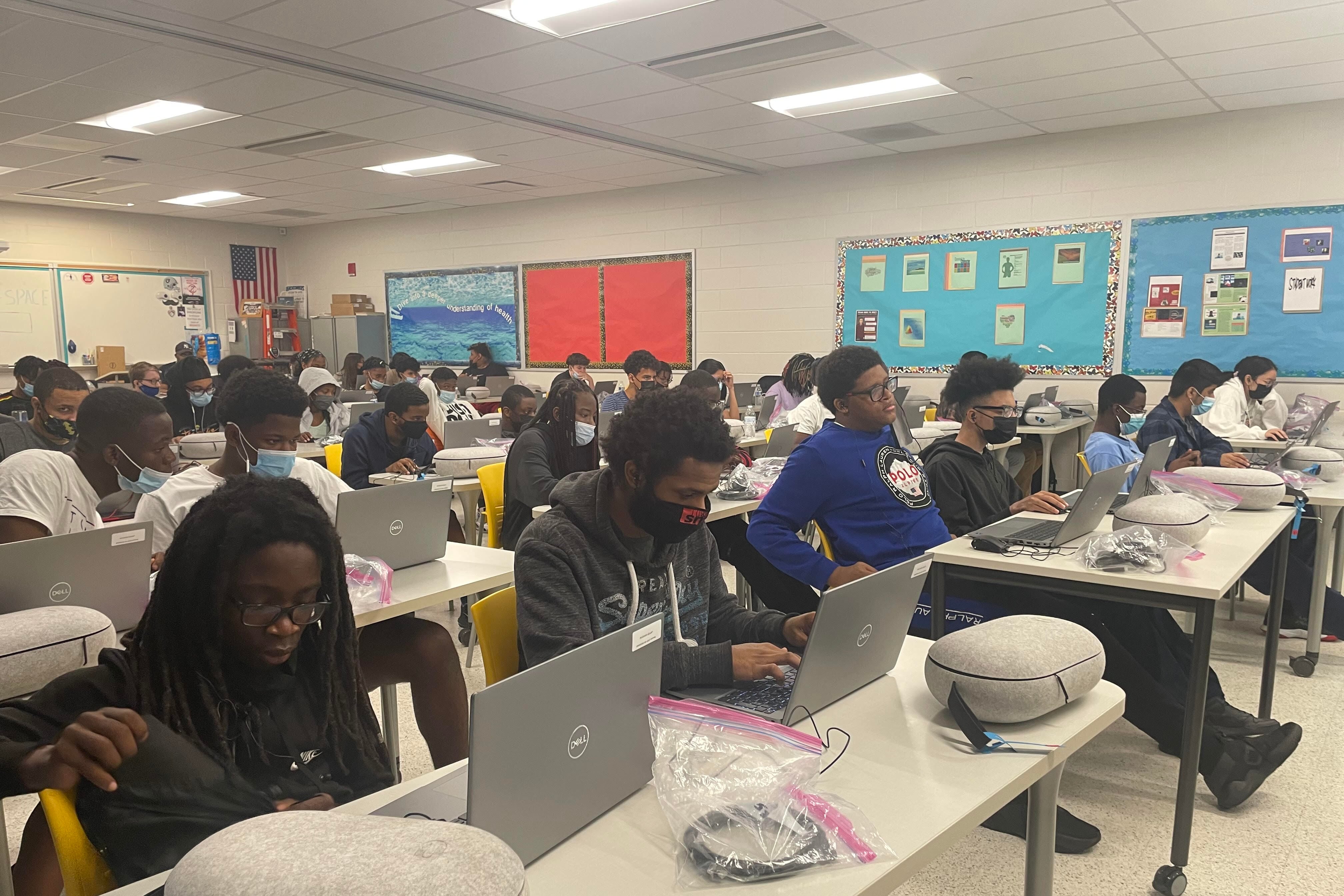Dante Hernandez, a rising ninth grader at Technology High School, never imagined that an Oculus headset would be his way of getting to work.
This summer, it is – and his office is in the virtual world.
While some teens find jobs in retail or restaurants, Hernandez and 50 other Newark students are spending their vacation from school in an immersive reality called the metaverse, a virtual version of everything you can do in real life. For six weeks, students learn the skills to code, develop virtual software, and find ways to put their new knowledge to the test.
“We enter a virtual building and everything’s there for us. We just start learning,” Hernandez said. “This kind of opened our eyes more to see, like, what the metaverse has in store for us in the future.”
This summer, roughly 3,000 Newark students between the ages of 14 to 24 are working in career and technical education-related jobs as part of Newark’s summer youth employment program. The city places and pays students each year in a variety of summer jobs and internships where they get hands-on experience that provides them the skills to reach future career goals.
The push to provide more career and technical education has grown over the years, especially as the pandemic has forced schools to search for new ways to engage students who have disconnected from learning. State and local leaders have also noted the importance of having more of these programs for high school students looking for opportunities after graduation.

According to the New Jersey Department of Education, approximately 77,000 high school students in the state participate in career and technical education pathways. Experts say students in these pathways have a 10% higher high school graduation rate than those who are not.
State and local officials are also pushing for more opportunities for students.
Last week, Gov. Phil Murphy awarded school districts and county colleges a second round of grant funding through the Securing Our Children’s Future Bond Act. The grants will fund improvements and enhancements of career and technical education programs in county vocational-technical school districts and county colleges throughout New Jersey.
This year, Newark’s summer program launched its virtual reality track with 51 students who had little to no experience in virtual reality.
Cody Piggot runs the virtual reality program and creates projects and lessons for the students. He gets help from another Newark Public Schools alum, Davina George, who helps students on a day-to-day basis.
Ayomide Adekoya will be a senior at Science Park High School this year and says the program is giving him a head start in the tech field.
“I feel like this program has sort of given us an advantage,” Adekoya said. “We’ve been able to meet a person in the space and being able to see someone succeed in the field also provides a form of motivation for us.”
The program partners with nearly 100 university and business communities, nonprofit organizations, and city government departments to place students in jobs throughout Newark. The Newark Workforce Development Board, which oversees the city’s youth program, funded the group's Oculus headsets, laptops and food.
Marsha Armstrong, the city’s youth program director, puts job seekers through a rigorous interview process before being selected and matched with an employer.
The program is meant to give students “real-world experience” and prepare them for future jobs, Armstrong said. Interested participants are required to fill out an application online and submit their resumes before they reach the interview stage.
After that, Armstrong and other program leaders interview students, and selected applicants are placed in positions in local hospitals and nonprofit organizations. The city also launched its first construction and building track as part of the summer jobs program.
“We have people just really coming to the table trying to figure out how they can help young people,” Armstrong added.
The program also provides practical education for students, including financial literacy courses every Friday and support for families of those participating. Sometimes, students’ home life may interfere with their work but Armstrong says the goal is to encourage them to get ahead.
“Even if it’s not sometimes just a paycheck, it’s tears and a hug,” Armstrong added. “It’s just helping them know that people in their community are rooting for them and no matter what, we’re not going to allow them to fall.”
Aside from hands-on experience, students get the chance to learn something new during the summer and stay busy. Shamere Holifield, a soon-to-be senior at Weequahic High School, said he would spend his summer playing basketball if it wasn’t for the program. Others such as Ridwanulahi Banjoko said they’re using the opportunity to invest in their future.
Learning how to code can be difficult, Banjoko said, “but you got people to help you learn this for free.”
While money is a factor for some families, Lisbeth Soto Leyba, who will be a senior at Donald Payne School of Technology this fall, said the summer program has allowed her to introduce her family to a field they never imagined she could work in.
“My mom at first was skeptical. She said what is this gonna do for you?” Soto said. “But so far, she’s like, actually liking the idea because I tell her every day the things that we do here and how my day is going.”
During last year’s budget meeting, Newark Public Schools superintendent Roger León said this year’s budget would include facility upgrades to enhance career and technical education for the district’s six comprehensive high schools including East Side, Barringer, Central, Shabazz, Weequahic, and West Side. León did not specify what those facility upgrades would be.
The city’s summer youth employment program runs through August and program leaders hope students in its inaugural virtual reality class will transfer their skills to the real world.
“Our goal is to produce talent in our cohort of 50 that become developers for big companies in the tech space,” Piggot said. “Virtual reality is the future.”
Jessie Gomez is a reporter for Chalkbeat Newark, covering public education in the city. Contact Jessie at jgomez@chalkbeat.org






